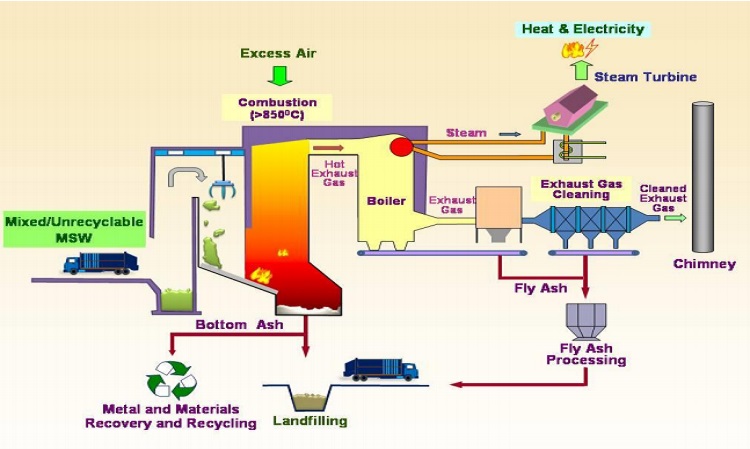Industrial waste management system refers to the practices and procedures that are put in place to effectively manage and dispose of the waste generated by industrial processes. It involves the identification, collection, transportation, treatment, and disposal of industrial waste in a way that minimizes its impact on the environment and human health.
The industrial waste management system typically involves various stages, including waste generation, segregation, storage, treatment, and disposal. The waste generated by industrial processes can be hazardous or non-hazardous, and the management approach for each type of waste may differ.
Industrial waste management systems may include a range of technologies and methods, such as waste reduction and recycling programs, waste-to-energy facilities, landfilling, incineration, and other forms of treatment. Effective management of industrial waste can help reduce environmental pollution, conserve natural resources, and minimize health risks for workers and nearby communities.
Industrial waste management refers to the process of handling, treating, and disposing of waste generated by industries in an environmentally safe and responsible manner. Effective waste management is important for reducing the negative impact that industrial activities can have on the environment and public health.
The Management of Industrial Waste Involves Several Steps, Including.
- Waste identification and characterization: This involves identifying the types and amounts of waste generated by industrial processes and determining their characteristics, such as toxicity, flammability, and corrosiveness.
- Waste minimization: The goal of waste minimization is to reduce the amount of waste generated by industrial processes. This can be achieved by implementing measures such as process changes, recycling, and reuse of materials.
- Treatment: Treatment is necessary to ensure that industrial waste is safe for disposal. Treatment processes can include physical, chemical, and biological methods.
- Disposal: Once industrial waste has been treated, it must be disposed of in a manner that is safe and environmentally responsible. This can include landfilling, incineration, and other methods.

In addition to these steps, effective industrial waste management also involves monitoring and reporting to ensure that waste is being managed in compliance with regulations and environmental standards.
Effective Industrial Waste Management is Important For Several Reasons.
- Environmental protection: Improper disposal of industrial waste can lead to environmental pollution, which can have negative impacts on air, water, and soil quality, and can harm wildlife and human health. By properly managing industrial waste, the risks of environmental pollution can be minimized.
- Resource conservation: Industrial waste often contains valuable materials that can be recovered and reused. Proper waste management practices, such as recycling and reusing materials, can help conserve natural resources and reduce the need for new raw materials.
- Compliance with regulations: Many countries have regulations that require industries to properly manage their waste. Failure to comply with these regulations can result in fines, legal liabilities, and reputational damage.
- Cost savings: Effective industrial waste management can result in cost savings for industries. By reducing waste and implementing recycling and reuse programs, industries can lower their operating costs and reduce their waste disposal expenses.
- Sustainable development: Proper industrial waste management is an important aspect of sustainable development. By managing waste in an environmentally responsible manner, industries can contribute to the long-term sustainability of their operations and the communities in which they operate.
The Industrial Waste Management Has Several Uses.
Resource Recovery
Industrial waste often contains valuable materials that can be recovered and reused. Through proper waste management practices such as recycling and reusing materials, industries can recover resources and reduce their reliance on virgin materials.
Energy Recovery
Some types of industrial waste can be used as a source of energy through processes such as incineration or anaerobic digestion. By recovering energy from waste, industries can reduce their energy costs and their reliance on non-renewable energy sources.
Soil Improvement
Some types of industrial waste, such as certain types of sludge, can be used as a soil amendment to improve soil fertility and structure.
Construction Materials
Industrial waste can be used as a raw material in the production of construction materials such as bricks, concrete, and asphalt.
Water Treatment
Industrial waste management can also include the treatment of wastewater generated by industrial processes. The treated water can then be reused for industrial or agricultural purposes.
Recycling of Industrial Waste
Industrial trash needs to be handled scientifically and recycled. Industrial consultants must ensure trash is managed properly, in conformity with legal requirements, and without endangering the environment.
Additionally, the whole cost of the process must be carefully taken into account. Initiatives for waste management and recycling could be beneficial to all industries in different ways.
Examples of Industrial Waste That Can Be Recycled.
- Metals: Many industries generate metal waste, which can be recycled into new products.
- Plastics: Industrial plastics can be recycled into new products such as packaging materials and building materials.
- Glass: Industrial glass waste can be recycled into new glass products or used in construction materials.
- Paper and cardboard: Industrial paper and cardboard waste can be recycled into new paper and cardboard products.
- Electronic waste: Electronic waste generated by industries can be recycled to recover valuable metals and other materials.
We at Kerone, manufacture, supply our industrial equipment. We provide a comprehensive range of industrial waste management solutions, which help industries manage their waste in an environmentally responsible and sustainable manner.


